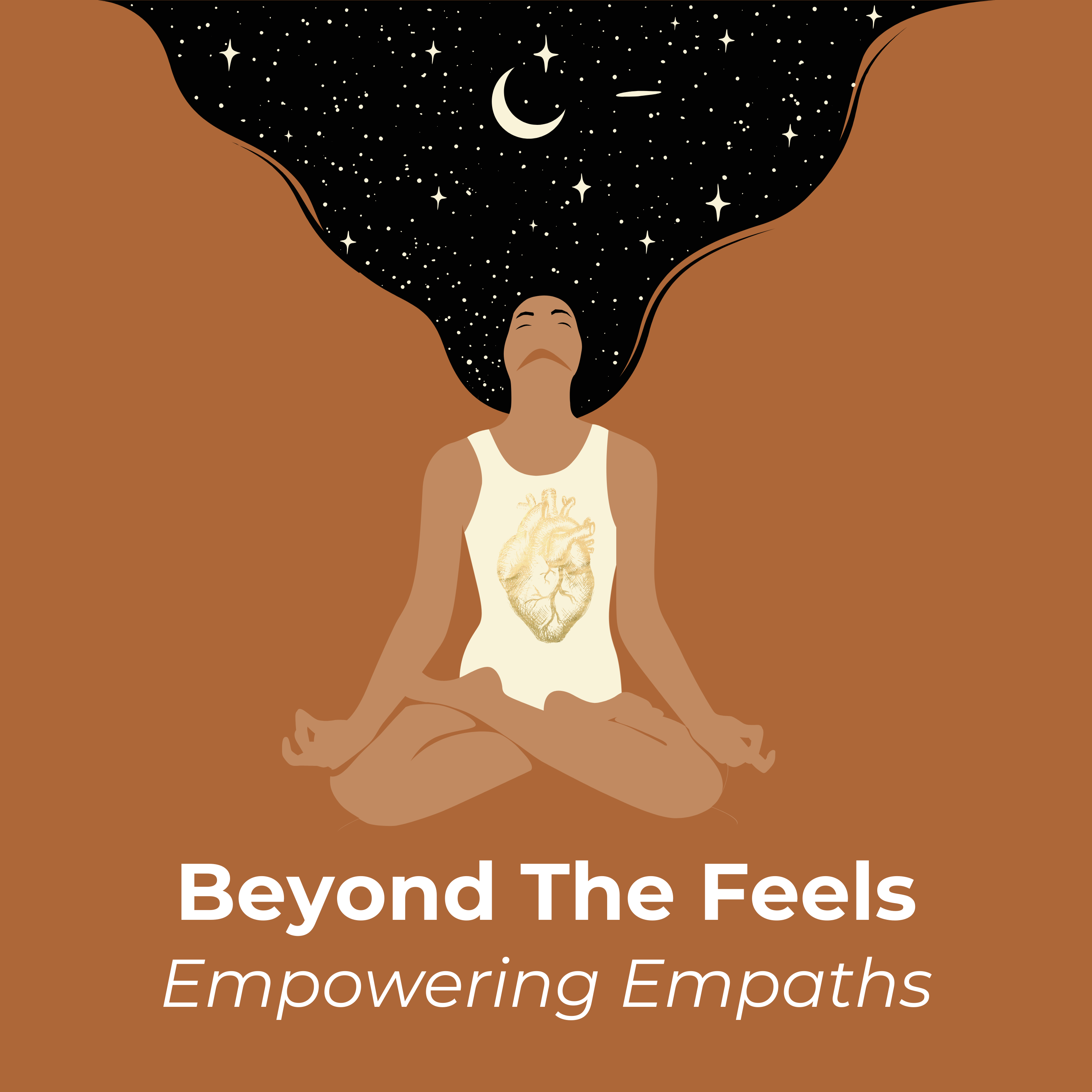Episode Transcript
[00:00:00] Speaker A: The world of healing can be treacherous, but suddenly spiritual aims to provide real, honest, practical, spiritual knowledge and wisdom for the true seekers among us.
The goal is to ignite the divine human within each listener, raising the collective consciousness for our planet. We will challenge your preconceptions, push your buttons, and encourage deep reflection. We're not here to adhere to the status quo of what the new age spiritual market wants you to buy into and believe. Consider this your antidote to the woo woo and a place of woo you.
[00:00:54] Speaker B: Oh, boundaries, boundaries, boundaries, boundaries.
You know, I feel like boundaries is the word of 2024 for me, and it's instituting boundaries because I feel like we all want to help others there. I think there's a server helper inside of each person. And some of us have really built that healer and server archetype within us throughout the years. And it's something that we focus on, especially, I would say, people who are nurses.
I feel like that's very strong within nursing. I have a lot of friends who are nurses. And just that archetype of being this tireless healer and helper is very pronounced. I think it's intertwined with how nurses are trained to.
But boundaries and giving your power away, that's the downfall of just being this selfless healer, twenty four seven and not taking care of yourself because you want to be the good girl, the good boy, the one who helps, the one who always supports.
So boundaries are such a tricky thing because they come through our family of origin, our parents, our extended family.
That's where we learn boundaries from what is okay and what is not okay, what is expected of you and what is not expected of you, what you're responsible for and what you're not responsible for.
And God bless parents, but they bring with them to their children what their parents taught them. So there's this transgenerational passing down of boundaries and rules and expectations and mores. And if you have a family where you are expected to be and do everything, which for me, I could say that's definitely how I was raised.
I first generation american, my parents both came here from Greece a year before I was born. My father came from a very small village, and my mom came from the second largest city in Greece. And I was the translator, I was the doctor, the lawyer. I played so many roles, and I became very parentified at a young age.
So when you're a parentified kid, you overextend yourself. You're hyper responsible because you had to be responsible for your parents.
And so it's very challenging to create healthy boundaries because you don't know what they are, because you're responsible for everything.
You have to do everything. You're the one balancing the checkbook at ten years old, or you're the one who's answering the phone in the home and negotiating doctor's appointments and whatever it is that's going on within your family that your family needs, because your family doesn't speak English and you do. So you bring that into your relationships with all people. And healers are no different.
When a healer comes from a place of being a parentified child, I can speak from personal experience, being a. A person who heal or helps the heal, or the healing of others and their journey. I feel very responsible and invested in people's outcomes.
And there was a time when I was first starting as a healer where I never thought I was doing enough, so I would give people extra time, or there would be murky boundaries in terms of being friends with my particular clients because it made them feel safe, or it made them feel like I was doing everything I could to help them on their healing journey, which that's not good, because it depletes you. It depletes you when you have no boundaries. It also creates a dynamic where the client's off the hook, where they don't have to really do a lot of work because you're doing all the work you're doing the most, you're doing extra, and the client also has to do the work.
Again, you can guide them, you can support them, but you have to have the boundary, because at the end of the day, you're not healing anybody. It's really the person who is asking for the healing. It's really their work to do. You're just facilitating it. So boundaries are incredibly important, but they're incredibly challenging also. And it's a.
It's a practice, not a perfect. And you will find that when you cross a boundary, there will be consequences on you. I could, again, I could speak from personal experience. I've seen where in the moment, I didn't think it was a boundary cross. But then later on I felt the repercussions of my boundary crossing.
[00:06:25] Speaker A: I hate to be a broken record, but for me, it's about enhancing that self awareness and realizing that boundaries aren't fixed.
As I've become more spiritual, things change. As far as. Well, boundaries change. Maybe they'll go further away or come closer, but they can change as well. And even the way you relate to people, the way I relate to people has definitely changed where I've become more open but more guarded in a weird way. Like I'm more open but I'm more guarded where okay, now here's what I have to offer. And it's out there. But now, whatever the boundary used to be, it's actually more rigid now. But it's a little further back because I'm a little bit more tolerant, I think, trying to be more compassionate.
And I think for the listeners out there, if your emotional or physical boundaries are crossed, whatever they are, you need to be clear and let the healer know that if it's the other way and at the same time, you need to know if you're pushing the other way. And hopefully you'll have a good healer who can let you know that and then examine that issue and say, hey, if youre leading with this, first of all, it aint going to happen. But now lets work through it because I want to help you work through that because if youre acting this way to me, maybe youre acting like this with other people who arent me in the real world, and its something we should work on. And depending on the situation, whether the pushback is too far or making you feel uncomfortable, then it may be time to move on from that healer. If theyre pushing, I think, too far, and it's all about comfort.
And this could be with a healer, this could be with a personal trainer, it could be with a yoga like it could be with anyone. Right. And at the end of the day, you need to be comfortable and doing the work. And if you're aware enough to know other things are getting in the way of the work, it may be time, I think, to move on.
The most important thing would be to realize boundaries can change and they can go become more rigid or less rigid. And I guess in my weird way, I'm offering more and more open, but they've actually become harder as opposed to telling everybody and letting everybody know everything about me. Because what I've discovered is sometimes, well, actually, no, not sometimes. Most of the time, people don't care.
It's like, hey, I'm having this problem and I think that's more me going. And in a weird way, it may seem cold, but I'm like, well, what do you want me to do about it? It's your life.
I'm here to listen and maybe relay a situation where I've gone through similar what I did, but I can't do anything for you.
It's your life, right?
[00:09:50] Speaker B: Yes. You cannot do anything for anyone. That is true most of the time back to more so about boundaries being crossed.
If you are, if your boundaries are being crossed, whether they be physically, emotionally, spiritually, if you are fearful to bring that up to your healer, that is information.
If you are fearful to bring them, bring to them what is going on for you, then that is also very scary. Because what you're saying, or what I think people are saying in that situation is I don't want to be judged. I don't want negative repercussions to happen by me instituting a boundary and communicating that boundary. So if your healer has given you the impression that it's not okay for you to tell them what's going on when a boundary violation happens, you need to look at that healer again. Because if that's how they're working with you, then how is your healing really going to be facilitated? When you don't feel free enough to tell people the truth, especially with someone you're working with so intimately within a spiritual context or an emotional context, you've got to be able to tell that trainer, yoga teacher, healer, hey, you know, when you said this about me, it made me feel this way, or when you touched me this way, this was a boundary crossing and it's not okay.
And most healers, if they're doing any kind of physical touch, any healer worth their salt, will be sure that you know what kind of touch that they do, what kind of therapeutic touch that they use within their modality. And there has to be consent prior to any work happening. There needs to be consent always. There needs to be permission. And to your point about boundaries being, you know, mutable, the healer should be able to also say to you, if this changes at any time, just let me know. If touch was okay today, but it's not okay tomorrow. You just need to let me know.
Again, there needs to be consent, permission. You should feel very free and open to tell that healer where your boundaries are and if and when they are violated in any way.
But if you don't feel comfortable in doing that, that, again, is information for you. And you need to look at that healer more carefully and your relationship with them. And it's even a greater opportunity for you to look at what your boundaries are in your life in totality, how you communicate your boundaries and where they came from. And so there's a lot of deep work that you can do just with boundaries.
And rather than never seeing a healer again, if they've crossed a boundary that they maybe didn't know about, with you doing the work of repairing and reconciling that relationship by being honest and open with that healer so that you can grow even more.
In a therapy world, we usually tell clients, or I've told clients and my colleagues have told clients, you know, you first will start to feel worse, and then you'll start to get better.
Because what's happening is when people come to a therapeutic space, they will unburden themselves of so much of what's been going on with them. And initially they'll feel better because they'll feel lighter. But then the reality of what that information brings starts to creep in. And then there's. My dear friend calls it a vulnerability hangover, where I've just been vulnerable with this healer or this therapist, and now I feel like I'm being judged and criticized for what I disclosed.
So there'll be that vulnerability hangover, and then they'll also be. There also will be the reality of, oh, my gosh, I'm really broken. Something is really wrong with me. There's no way to repair my life, my psyche, my spirit. I'm irredeemable.
And so there's despair, and there's lots of grief that comes with that.
And so it's really the healer's opportunity to meet that person in a space of safety, of compassion, of love, and reassure the person that if they continue working, they will eventually find a place of equilibrium and a place of peace and a place of growth.
But there's some healers where you're still working on the same things that you were working on five years ago with them, and, like, it's like every year's cycle, they will continuously be working on, oh, yeah, didn't we talk about my ex boyfriend last year when we were working together? Why is this coming up again? It seems like things are not improving at all.
I'll get a momentary relief, and then here we go again. Back into the depths, back into the pits, and the healer will just brush it off as well. That's just what it is and give no explanation. And it's a sign that you may have either outgrown that healer, or perhaps that healer is just not in alignment with you or never was, because you've waited it out, you stuck it out, you've done all the things that you were asked to do.
Your life is not getting better, but you're doing the work. So your life is not getting better, but you're doing the work of what you're being asked, and you're pushing your growth edges, and you're doing all the things, but things are still status quo, not better.
[00:16:27] Speaker A: I love that you said you're doing the work, because I was going to ask you, how do you differentiate between somebody who's trying to draw the string along? Elongated. Longer, longer, longer. More money, more money, more money. Revisiting something like you said that you thought was covered and then. Well, maybe I didn't finish what I thought. Maybe I didn't work through it a year ago and I thought I did. And they're bringing it back.
Obviously, if somebody's bringing something back to make things go longer so you can pay them more, that's definitely a major, major red flag there.
But as the listener who's hearing this, going on this journey, working with somebody, and it's been a while, how do you suggest they differentiate between.
I thought I worked on that, but it's popping up again and I'm doing the work, or is the person bringing it up again and trying to make things go longer so I could pay them more? What, what should work? Obviously we should be doing the work, but how to differentiate between those two situations if they pop up many times.
[00:17:51] Speaker B: This is coupled with.
This is coupled with, like, a lack of poor boundaries. It's like this is one of.
It's a sign, but it also comes with other signs. It's not the only thing.
And I've seen people very healers, very skillfully elongate healing sessions by continuously going back to relationships. There was somebody who was, one of my friends was dating somebody for like three months, and every session was about this person, but the real grist in the mill was about their relationship with their father. But the healer wouldn't touch that because they just didn't have the ability to touch that. So they just kept on looking at the symptom, which was the relationship with the boyfriend or the ex boyfriend, and they were just using that because that was top of mind with the client, and the client didn't want to do the work with the father, or that's what the healer believed. So when relationships are significant, like parents or siblings or spouses, and they've lasted for years and years and years, I could see where that could come up multiple times.
Because if the relationship is a 30 year relationship, one or two healing sessions is not going to do it. And you could work on your issues with your mother for the rest of your life. That's possible, but when it's shorter term relationships or things that are more symptoms rather than roots, but they're overblown because that's what the particular client wants to hear about because it seems more top of mind and more in the moment and important, then that's something to really look at even more. But with parents and things like that, with people in your life where you've had these long relationships, I can see where you can do work on parents for forever.
It's pretty common in therapy. That's typically what happens.
I don't know if anybody who in therapy or within a healing space was like, I am fully good with my relationship with my father. I have zero issues.
You can get pretty close to it, though.
You can get pretty close to it. But again, there will always be some sort of thread there. But when I dated someone for two months and I go to a healer and it's been five years, and we're still talking about that person with two months, two months of dating, and we're still talking about this guy, it's like, what's going on here? Am I missing something or is the healer just not skilled enough? Doesn't have the desire to look at what the root issue of something is, and it's just wanting to string me along in a way.
[00:20:56] Speaker A: So when we all start out, if we're going to get help from spiritual healer, I think you alluded to this earlier.
There will be this euphoria.
You're recognizing things you didn't before.
The energy is increased.
Hey, I'm happy with this person. They're helping me.
And then inevitably it'll ebb and flow depending on if you are working on something really deep, I think, and then your energy will go up again or things are changing.
How long do you suggest for those listening?
They give it with a given healer, what's a good time, a frame of reference to decide, yeah, this isn't working.
[00:21:48] Speaker B: I think that's such a personal determination.
And your intuition will tell you if you're listening and paying attention and allowing your intuition to give you the information, the timeframe will come from you. It really is yours to have yours to determine what the timeframe is, because there's no one size fits all answer of oh, if within ten sessions, if you're not quote unquote better, then you need to move on. So it's very individual.
And I think that as long as you're being very, very mindful and listening to your own intuition, you will have the answer for.



